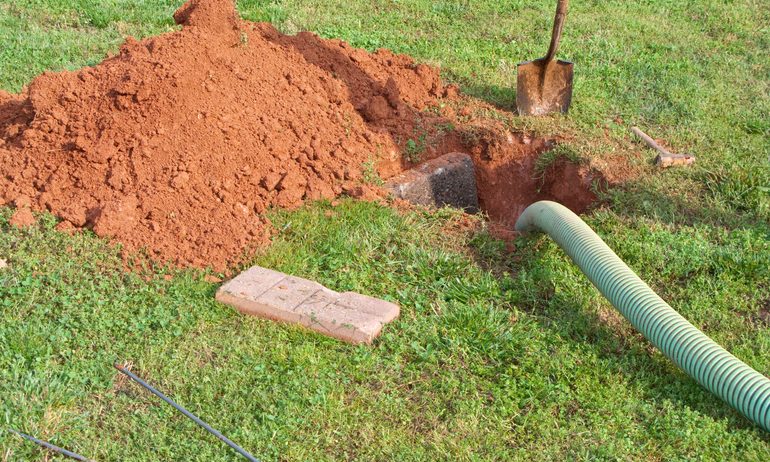Does Homeowners Insurance Cover Septic Systems?
Home insurance may pay to repair septic tanks that are damaged by an event your policy covers.

Many, or all, of the products featured on this page are from our advertising partners who compensate us when you take certain actions on our website or click to take an action on their website. However, this does not influence our evaluations. Our opinions are our own. Here is a list of our partners and here's how we make money.
Home insurance may pay to repair septic tanks and pipes that are damaged by fire, lightning and other covered events.
It doesn’t cover damage caused by lack of maintenance, wear and tear, tree roots or improper installation.
Homeowners with septic tanks should consider buying additional water backup coverage.
A severe storm sweeps through your neighborhood. Lightning strikes nearby, and when the storm passes, you notice your septic tank is damaged. Because home insurance typically covers damage caused by lighting, your insurance may help cover the cost to repair or replace it. But there are many other types of septic tank damage your policy won't cover. Here's what you need to know.
Does homeowners insurance cover septic systems?
Your home insurance may cover damage to your septic tank, leach field and connecting pipes if the damage is caused by a sudden, accidental event the policy covers, such as fire, hail and lightning. However, it’s important to read your policy carefully to check for exclusions.
Depending on your policy, your septic tank may be covered by the dwelling portion of your policy, which covers the actual structure of your home. Alternatively, it may be covered by the other structures portion of your home insurance policy, which covers things like fences, sheds and detached garages. Your insurance agent should be able to tell you which coverage applies to your septic system.
Other structures coverage is often 10% of the dwelling coverage limit, so if your dwelling coverage limit is $350,000, your other structures limit would be $35,000. Check your homeowners insurance declarations page for your exact limits.
When you file a claim, your insurance company may send out an adjuster to determine what caused the septic tank damage. Learn more about how to file a home insurance claim.
When are septic systems covered by homeowners insurance?
Your homeowners insurance policy will generally cover damage to your septic system if it's caused by a sudden event your policy covers. These can include:
Fire, lightning or hail.
Snow or freezing temperatures.
Damage from vehicles.
Vandalism.
Falling objects.
Explosions.
For example, if a lightning strike cracked your septic tank, it would likely be covered.
When are septic tanks not covered by homeowners insurance?
Homeowners insurance won’t cover many septic system issues, including damage caused by:
Regular wear and tear.
Lack of maintenance.
Roots or tree limbs that slowly cause your tank or pipes to crack.
Improper installation, such as a septic tank that wasn't buried deep enough.
Floods or earthquakes.
Backups resulting from flushing the wrong materials down the drains.
Most home insurance policies name earthquakes and floods as exclusions. If you live in an area prone to these disasters, consider purchasing a separate flood or earthquake insurance policy.
Water backup coverage for septic tanks
A standard home insurance policy may pay to repair damage to the septic system from a covered event, but it won’t pay to repair damage caused by a backed-up sewer. A water backup endorsement, also known as sump discharge or overflow coverage, can help cover that gap. This add-on helps pay to repair damage caused by water backing up into your home from a sewer, drain or sump pump. It can also help pay to replace your flooring or any items that get ruined.
Tips for maintaining your septic system
A well-maintained septic system lasts longer and causes fewer problems than a neglected one. These maintenance tips from the Environmental Protection Agency can help prevent damage and expensive repairs.
Inspect and pump every three to five years. Routine pumping removes sludge buildup and helps prevent clogs or backups. Have a septic service professional come out and service your system regularly.
Only flush waste and toilet paper. Avoid flushing grease, feminine products, diapers, paper towels and other items that can clog pipes.
Avoid harsh chemicals. Limit use of harsh chemicals like bleach, drain cleaners and solvents, which kill beneficial bacteria in your septic tank.
Reduce water usage. Repair leaky faucets and spread laundry use over multiple days to avoid overloading your system.
Keep heavy objects off the drain field to prevent crushing buried pipes. Don't drive or park vehicles over the drain field. This can compact the soil and damage pipes. Also, keep your eye on any trees that could be encroaching your septic tank system.

